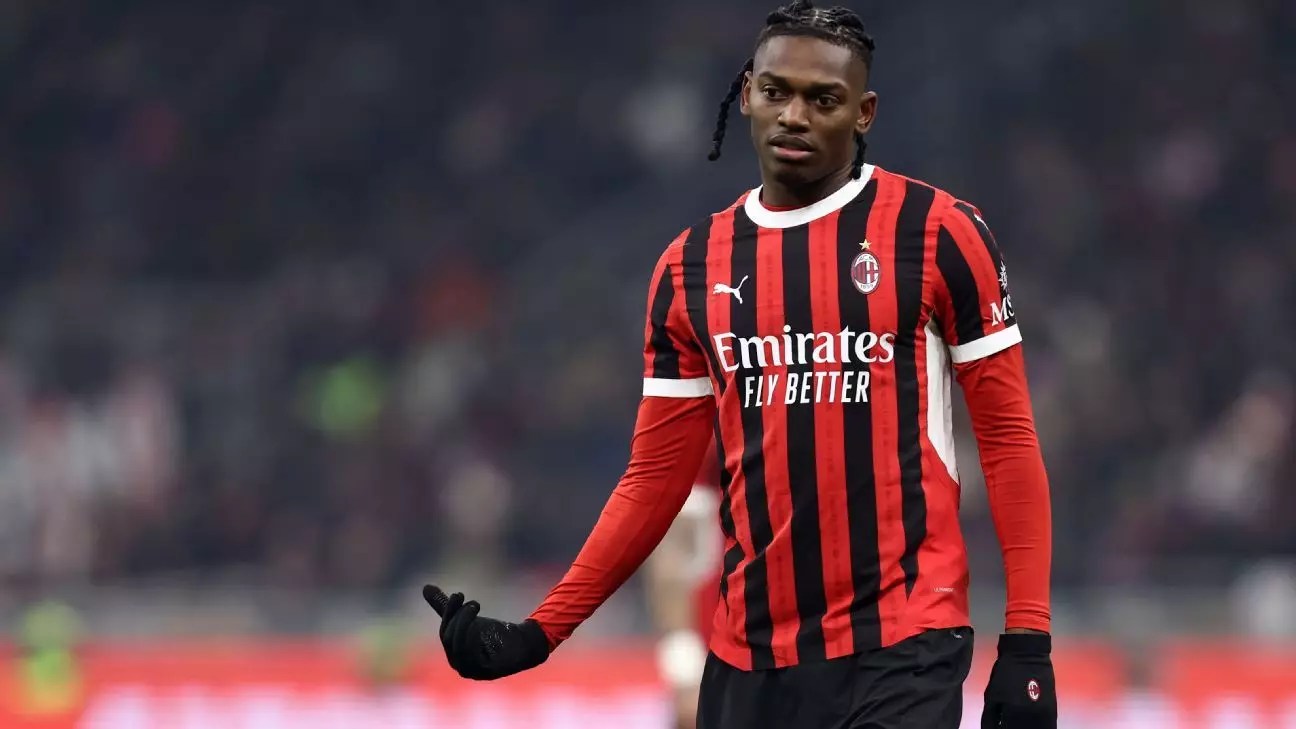In a fiercely competitive transfer market, FC Barcelona is making audacious moves that reveal their aggressive strategic mindset. Recent reports suggest that the Catalan giants are preparing to meet a hefty price tag of around €70 million, plus add-ons, to secure the services of Rafael Leão from AC Milan. This figure underscores Barcelona’s willingness to spend big to reinforce their attacking line, signaling a clear intent to reclaim their dominance in European football. However, such high-profile acquisitions come with inherent risks, especially considering Barcelona’s ongoing financial struggles. Their desire for Leão, a player known for his blistering pace and creative flair, embodies their ambition to inject fresh energy into the squad. Yet, negotiations remain delicate, with club financial health and future income streams still shrouded in uncertainty.
Meanwhile, Barcelona’s pursuit of Nico Williams, who chose to extend his contract with Athletic Bilbao for ten years instead of moving to Camp Nou, demonstrates the club’s shifting priorities. The club’s focus appears to be on establishing a more calculated transfer strategy rather than impulsively chasing big names, understanding that financial prudence is key to long-term stability. This tug-of-war between big ambitions and economic reality exemplifies the tightrope walk that top clubs must navigate in the modern era of football transfer dealings.
Premier League Power Dynamics: Arsenal and Manchester United in a Tug of War
The pursuit of top-tier talent does not end with the European giants; Premier League clubs are also deeply embedded in high-stakes negotiations. Arsenal, driven by a sense of urgency, is seeking a new striker who can immediately address their offensive needs. Manager Mikel Arteta’s desire to finalize a signing within two weeks illustrates the timeliness with which top clubs are approaching transfers. The club’s current contention revolves around Viktor Gyökeres of Sporting CP, but negotiations have reportedly stalled, prompting Arsenal to consider alternative targets swiftly.
Similarly, Manchester United is navigating their own tumultuous transfer landscape. Marcus Rashford, a key player, is reportedly harboring dreams of a career move to Barcelona—an ambition that hints at wider strategic shifts within Old Trafford. Despite United’s valuation of Rashford at around £40 million, the player’s willingness to lower his salary to join Barcelona exposes the allure of playing for such a historic club. Meanwhile, United appears resistant to offering a loan deal, preferring a direct transfer—a stance reflective of their intent to maintain high standards and robustness in the squad.
The potential arrival of Jadon Sancho at Juventus adds another thrilling curveball to the transfer story. Negotiations between the Italian giants and Manchester United involve complex swap deals and financial arrangements, with Juventus willing to part with €25 million plus bonuses or exchange midfielders, such as Douglas Luiz. However, Sancho’s salary expectations and contract acceptance remain hurdles that could delay the move. These dynamics highlight the intricate negotiations that define modern transfer markets, where financial considerations, player ambitions, and strategic club interests collide.
Emerging Talents and Strategic Signings: The Face of Future Football
Amidst the high-profile moves, numerous emerging talents are catching the attention of top clubs looking to future-proof their squads. Chelsea’s recent signing of Jamie Gittens from Borussia Dortmund exemplifies a long-term vision, with the young winger committing until 2032. Similarly, Burnley’s acquisition of Kyle Walker from Manchester City reflects a smart recruitment move, gaining experienced Premier League stars to bolster a newly promoted side.
While some clubs focus on strategic youth development, others are chasing established international talent. Nottingham Forest secured Brazil’s Igor Jesus from Botafogo, demonstrating their intent to compete at a higher level immediately. Likewise, Manchester United’s signing of defender Diego Leòn from Cerro Porteño signals their emphasis on building a resilient backline with promising young players.
On the transfer front, clubs like Napoli, Juventus, and Atalanta are aggressively pursuing key targets, revealing a trend toward strategic flexibility. Napoli remains interested in Fiorentina’s Moise Kean as a potential replacement if Victor Osimhen departs, showcasing their keen eye for opportunistic transfers. Juventus’s efforts to offload Dusan Vlahovic or seek swap deals for Jadon Sancho reflect a pragmatic approach—balancing long-term planning with immediate squad needs.
Clubs’ Transfer Strategies: Navigating Uncertainty and Long-Term Planning
The tumultuous transfer window is characterized by a mix of calculated negotiations and bold moves, indicating a shift toward more strategic planning by top clubs. Inter Milan’s ongoing campaign to sign promising talents like Ange-Yoan Bonny and Fiorentina’s pursuit of Moise Kean underscore a broader trend: clubs are investing in youth and potential to sustain competitiveness amid financial restrictions.
Meanwhile, clubs like Al-Hilal are prepared to make colossal offers for star strikers such as Victor Osimhen once their initial targets are secured, exemplifying the aggressive, almost relentless approach some Middle Eastern clubs are adopting in their pursuit of immediate success. This infusion of cash into the transfer market is reshaping team compositions and intensifying competition globally.
From a tactical perspective, clubs are also leveraging negotiations for swap deals and installments, seeking to minimize immediate financial impacts while lining up long-term squad development. The high-profile saga surrounding Jadon Sancho’s potential move to Juventus and the multiple clubs interested in Benfica’s Orkun Kokcu or Atalanta’s Giorgio Scalvini exemplify this trend. It’s no longer just about buying ready-made superstars but about smartly building squads that blend youth, experience, and strategic flexibility.
In this fiercely competitive environment, clubs that are willing to adapt swiftly and negotiate cleverly tend to come out ahead. Transfer windows are shaping into chess matches, where patience, financial intelligence, and strategic foresight determine success—more than ever, football clubs are investing in their future with an eye on both immediate trophies and sustainable growth.


Leave a Reply